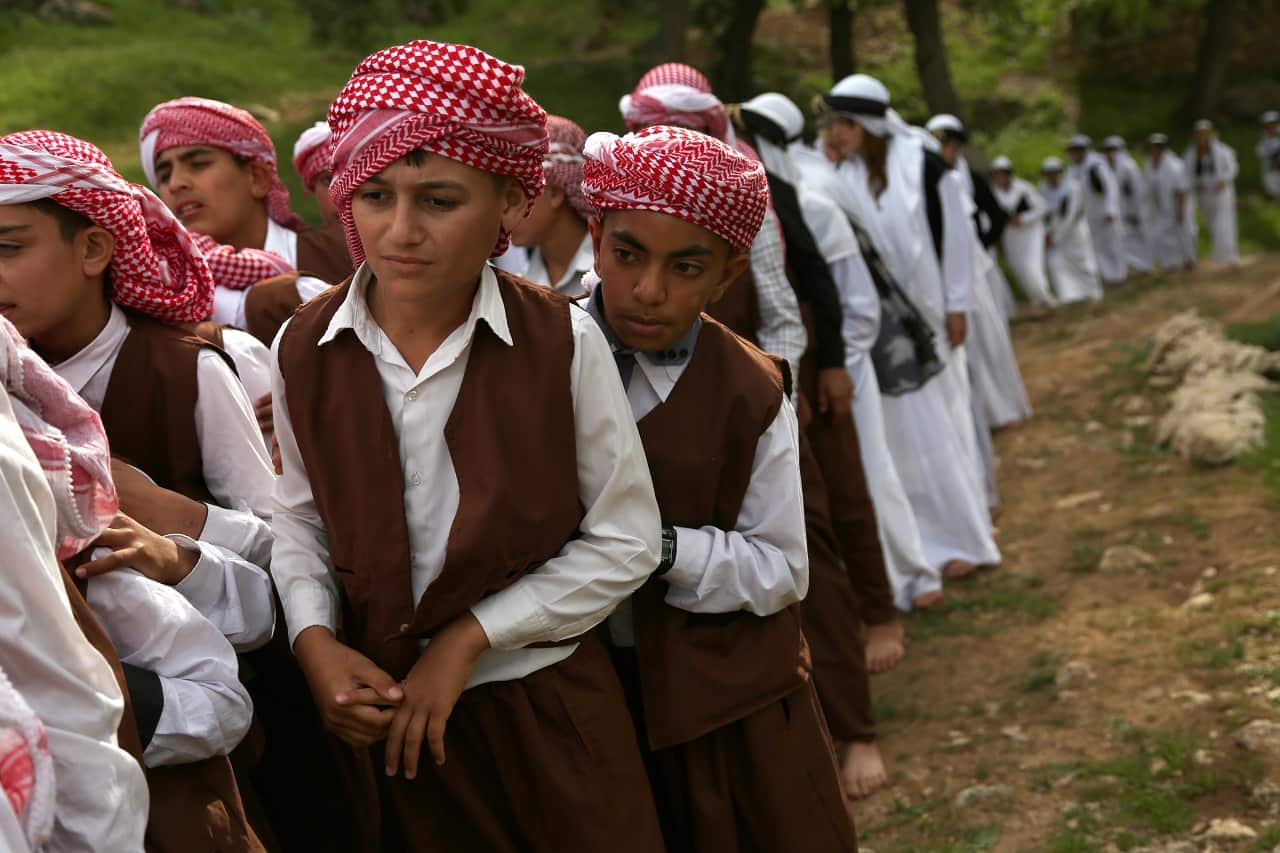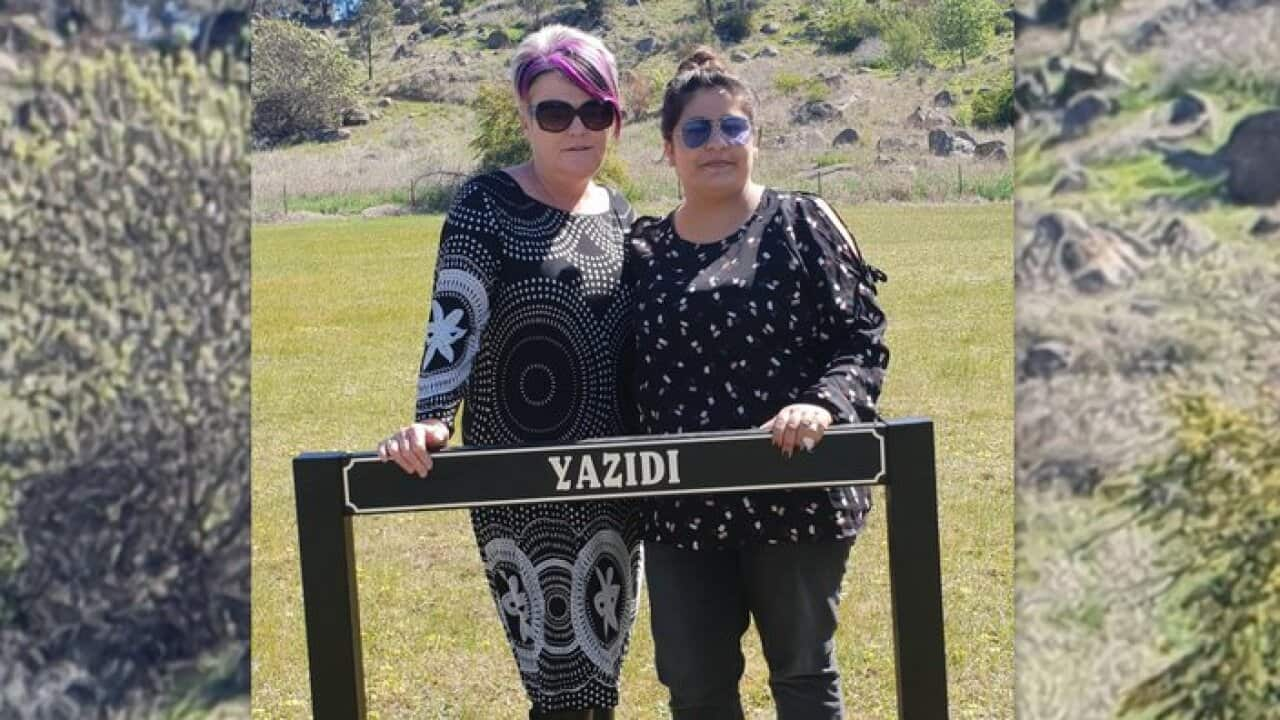The Australian government is understood to be considering whether to allow a Yazidi mother resettled in Australia to reunite with her teenage son, who was taken from her five years ago in Iraq and forced to fight with the so-called Islamic State.
Shvan* was recently freed after spending almost five years being held by the terrorist group and is now with his extended family in a refugee camp in northern Iraq’s Kurdistan region.
The teenager, who says he is 18, told SBS Kurdish via video call in Kurdish-Kurmanji: “They treated me unkindly by beating me a lot, their treatment was inhumane, and to them, we were their slaves.
“There was a lot of brainwashing on a daily basis like military and religious education.” Shvan said he was interviewed by an Australian official at a hotel in northern Iraq on 10 July and that they told him to wait while the government considers his visa application.
Shvan said he was interviewed by an Australian official at a hotel in northern Iraq on 10 July and that they told him to wait while the government considers his visa application.

The teenager, who says he is 18, told SBS Kurdish via video call in Kurdish-Kurmanji: “They treated me unkindly by beating me a lot, their treatment was inhuman Source: SBS
The Department of Home Affairs would not confirm if his application is being considered and said it did not comment on individual cases.
He says he saw many dead bodies while fighting and that he “witnessed how [IS fighters] would beat Yazidi women”.
Since being set free in March, Shvan now longs to be reunited with his mother and five siblings, who were resettled in Australia last year under a refugee program. “If I don’t see my mother I will die ... hearing her voice is not enough, I want to go to her, see her and cuddle her,” he said.
“If I don’t see my mother I will die ... hearing her voice is not enough, I want to go to her, see her and cuddle her,” he said.

The family was captured along with thousands of other Yazidis - a religious-minority - when the terrorist group attacked their hometown of Sinjar, Iraq, in 2014 Source: SBS
Shvan’s mother is desperately pleading for the family to be reunited.
“My son is worth the whole world to me, and I am sure that my son would not do anything bad,” she said.
“When I heard my son was freed I was very happy, I could fly … he was freed from the hands of those infidels.”
‘I was afraid’
The family was captured by IS in 2014. Shvan was separated from his parents, as well as his four sisters and brother who were all under 18 at the time.
“In Iraq, we were separated from men and when we got to Syria I was separated from my family,” Shvan said.
The family was later released and spent time in a refugee camp before coming to Australia last year. They haven’t spoken to the children's’ father since 2014 and don’t know if he is still alive.
Shvan said he spent about two years in an IS-run re-education school in Syria, before being sent to fight. “We would wake up in the morning and be taught religious and praying lessons. Then we would have a lunch break and after that, we would continue with the religious and praying lessons,” he said.
“We would wake up in the morning and be taught religious and praying lessons. Then we would have a lunch break and after that, we would continue with the religious and praying lessons,” he said.

Shvan's mother and siblings were resettled in Australia last year. Source: SBS
When asked if he witnessed beheadings - as other children living under IS have previously - he said he hadn’t but had heard a lot about them and knew what IS was capable of.
“I was afraid a lot. I tried many times to escape, but I didn’t get the opportunity,” he said.
Shvan’s mother says her son has told her he doesn’t want to open up any more about what he has experienced.
Persecuted minority
The family was captured along with thousands of other - a religious-minority - when IS, identified as a organisation by the Australian government, launched an offensive on their hometown of Sinjar, Iraq, in 2014.
IS regards the group as heretics and the United Nations considers the massacre of Yazidis in Sinjar and elsewhere as religious genocide.
Next month will mark the fifth anniversary of the Sinjar massacre, in which thousands of Yazidi men were brutally murdered and thousands of men, women and children were captured as slaves.
The family’s identification documents were lost during the attack on Sinjar. According to the UN’s refugee agency UNHCR, Australia resettled roughly 1,000 people from Iraq each year between 2014 and 2016. In 2018, Australia resettled only 99 refugees from Iraq, and in the first five months of 2019 had resettled 30 people.
According to the UN’s refugee agency UNHCR, Australia resettled roughly 1,000 people from Iraq each year between 2014 and 2016. In 2018, Australia resettled only 99 refugees from Iraq, and in the first five months of 2019 had resettled 30 people.

Yezidis trapped in the Sinjar mountains as they tried to escape from IS, are rescued by Kurdish Peshmerga forces and YPG August 09, 2014. Source: Getty
In March, the group of IS soldiers Shvan was with surrendered to US-backed Syrian Democratic Forces during an intense battle in Baghouz, a mountainous region near the Syrian-Iraqi border that was one of IS’s last pockets of territory.
He was held in a Kurdish prison for over a month, with Kurdish officials unaware he was a Yazidi. He was later released when they realised.
The first thing he did was call his mum.
“I had learnt her phone number off by heart and I telephoned her and she told me that she’s in Australia,” Shvan said.
Security debate
Shvan’s claim he was interviewed by an Australian official comes as the federal parliament last week passed a bill to allow temporary exclusion orders, giving the Home Affairs Minister the power to ban Australian foreign fighters from returning home for up to two years.
The orders wouldn’t apply to Shvan as he is not an Australian citizen.
'When you read the cases of these individuals … that have suffered at the hands of these barbaric animals … It's really unbelievably horrific and that's why Australia's acted to provide support,' (Peter Dutton, Home Affairs Minister, 2018)
There have recently been cases of Australian children who lived under IS being allowed to return to the country - but Shvan’s case is different in that he was never taken by a parent to join IS, but was captured.
When asked by SBS News whether the government would consider refugee applications from men who were taken captive by IS as children, Home Affairs Minister Peter Dutton said he wasn’t going to provide a “running commentary” on each individual family or case.
Instead, he commented on those who were already living in Australia before being involved with the group. “Let’s be realistic about those we are bringing back, other as I have said before have been in violent relationships or have been sold or traded into some other relationship in horrific circumstances. That’s the reality of what we are dealing with,” Mr Dutton said.
“Let’s be realistic about those we are bringing back, other as I have said before have been in violent relationships or have been sold or traded into some other relationship in horrific circumstances. That’s the reality of what we are dealing with,” Mr Dutton said.

“I had learnt her phone number off by heart and I telephoned her and she told me that she’s in Australia,” Shvan said. Source: SBS
“I think the threat level for us is different, that some of the women pose, and I want to be very clear about this is the advice to me is that some of these women are as bad as any of the men we have seen,” Mr Dutton said.
Last year, Mr Dutton told SBS News, Australia was “compelled to act” to help more Yazidis taken by IS.
“When you read the cases of these individuals … that have suffered at the hands of these barbaric animals … It's really unbelievably horrific and that's why Australia's acted to provide support.”
‘He will not be a threat’
Director of the Counter-Terrorism Policy Centre at the Australian Strategic Policy Institute, Isaac Kfir, said while not all children who were captured by IS will hold radical views and pose a potential security threat, some may.
“Over the past 15 years, we have developed an exceptionally robust system of assessment and risk evaluation. Australia has some of the best people in the deradicalisation field in the world, we need to trust their assessment,” he said. Mr Kfir said Australian authorities were capable of providing the extra mental health and security-related support needed for traumatised children returning from the Middle-East.
Mr Kfir said Australian authorities were capable of providing the extra mental health and security-related support needed for traumatised children returning from the Middle-East.

Yazidi children allegedly used by IS as slaves visit grave of Yazidi girl Zairo Khider in Lalish, April 2018. Zairo died in IS captivity in Sinjar in 2014. Source: AAP
“If we begin by treating the problem as we would treat any other child soldier anywhere else in the world we might understand the magnitude of the deprogramming we have to undertake.”
Shvan’s mother says her son is not a danger to the Australian community.
“He won’t do anything bad ... I thank God that he hasn’t been brainwashed, he is all there … he is fine, he will not be a threat to anyone,” she said.
In the past, Australia has taken child-soldiers as refugees from conflicts such as South Sudan, Sierra Leone and Uganda.
Director of Human Rights For All and refugee lawyer Alison Battison says Australia shouldn’t discriminate against the son due to his time fighting with IS under duress.
“I note that Australia has taken former soldiers from other countries, particularly from African conflicts, so it is absolutely not a bar to somebody seeking to be reunited with their family in Australia or seeking asylum,” she said.
In the past, Australia has taken child-soldiers as refugees from conflicts such as South Sudan, Sierra Leone and Uganda.
But despite Shvan’s assumed age, she added in the current political climate, Australia accepting a former IS soldier could be difficult.
“There is a lot of hysteria and legitimate concern about the ISIS conflict, but individual circumstances need to be taken into account, here you are talking to someone who was taken as a young teenager and forced to fight on the other side to his family, the circumstances are horrific,” she said.
She added that Australia should follow the spirit of United Nations conventions it was a signatory to, including the UN convention on the rights of the child, and consider his case fairly.
In a statement to SBS News the Department of Home Affairs said: “The Australian government operates a global Humanitarian Program in which places are allocated on the basis of resettlement needs and vulnerability, not applicants’ religion or ethnicity.”
The Department did not respond to questions about whether any other former IS child soldiers have been resettled in Australia.
For Shvan’s mother, after not seeing her son for five years, she has just one message to Mr Dutton: “Please bring my son here as soon as possible, because my son is my life”.
“I miss him a lot and I cannot wait to see him. I just want to hug him.”
*Name has been changed

